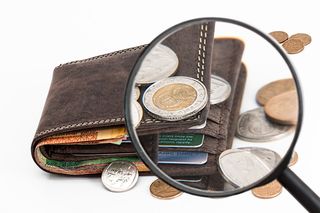Child Development
Financial Literacy: Learn It, Teach It, and Live It
“Saving for a rainy day.” “A penny saved is a penny earned.”
Posted March 18, 2019

“Saving for a rainy day.” “A penny saved is a penny earned.” “The best things in life are free.” “You can’t take it with you.” There are as many adages around saving and spending your money as there are days in a given month. YOLO, right? So why not live the life you want and buy whatever suits your fancy? Saving money is boring and today’s savings accounts only pay around 2% anyway—not even matching inflation for many everyday items (usatoday.com). If groceries are up over 28% and you can only make 2% in a savings account, why not buy the expensive pre-made dinner tonight? It doesn’t seem to make financial sense to put money away—or does it?
The recent government shutdown in the U.S. highlighted a scary truth for many Americans: Over half the population lives paycheck to paycheck. If something happens and that paycheck doesn’t arrive, bills can’t be paid (20somethingfinance). Living paycheck to paycheck works as long as the paycheck keeps coming, but what if you become ill, have an unexpected expense, or are a member of a group like the recent government employees who, through absolutely no fault of their own, just stopped getting paid?
Working in the financial and investment industry for many decades has taught me one thing—money is an emotional topic for many people. Many good financial advisors will talk about “your relationship to money”: How do you think about it? How does having money or not having money make you feel? What do you want money to do for you? Money can be associated with joy, and it also can bring about panic and fear.
Our ideas about money are typically rooted in our childhood experiences. As a parent, it is very important to be watchful about what you say about money and how you interact with it in front of your kids. There are many mistakes parents make by using a credit card and never showing the child how those small amounts add up to a total large final amount, or by telling a child “we have no money right now” but then choosing to purchase something that isn’t a necessity. And parents who do have a lot of money might not explain where the money came from, how hard it can be to make it and how easy it is to spend it. The most important lesson a parent can teach is managing different buckets of money—how some should go into savings, some into spending, and some into giving back. And in the spending category, there are necessities of life and fun things to do. Teach children how to allocate a small amount for fun so work isn’t just to pay the bills.
For many people, the income they receive may just cover their bills and doesn’t allow for saving anything additionally. However, for most people, the idea of true freedom comes from not having to worry about how you are going to pay next month’s rent or groceries and, instead, knowing you will pay your bills and have a bit left over for enjoyment. This can mean making hard choices sometimes, but having a relationship with money that is healthy over the long term often means a delay in gratification. The YOLO attitude can work—but only if you have the money to spare and you don’t wake up the next morning with a financial hangover.
To live differently in relationship with money, you must first understand how you feel and think about it. Take some time to write down, or talk into your smartphone, about what money means to you. Do you embrace the idea of making money? Do you worry you will “never have enough”? Do you spend every cent you get because buying things gives you some sort of stress relief and satisfaction (in the moment)? Do you use credit cards too much? Are you afraid of credit card debt? Identify how you talk to yourself about money and what sort of a relationship you have with it.
Go back to your childhood and upbringing. Think about what money meant to your parents. Did they talk about it? Worry about it? Hoard it? One family I worked with had threadbare towels growing up, only to learn, when the father passed away, that he had over $400,000 in a checking account. He had grown up with nothing, and by gosh, he wasn’t going to spend what he had on new towels! The adult children were struggling to do anything “nice” for themselves because they believed they were denigrating their father’s memory in doing so.
Set goals for yourself. Once you consider your relationship with money and your history with money, determine what you do want your relationship to be. What do you need to shift and change? Is saving important? Do you want to stop buying things for short-term gratification and rather focus on a long-term saving goal? Would you benefit by sharing more of your money with those in need? Do you want to talk to your spouse/significant other or your children more openly and honestly about money? There are so many aspects; decide what is most important to you and set your intention for it.
Next, work with a budget. Yes, as a financial professional I am well aware of how much people loathe to budget. Some months you can’t believe how much you’ve spent on electricity, or cable, or new shoes. But forcing yourself to determine what you do want to spend, and then tracking what you actually spend, gives you valuable information and helps you make decisions going forward. One family who tracked their expenses learned they were paying an exorbitant amount for water. No one in the family took long showers or seemed to waste water. In exploring the expense, they learned they had an outside leak and gallons upon gallons of water were running out of their back hose area every single day. They’d probably not have found the leak, except that they were watching the expenses and knew something was wrong.
If you do your budget and you find you have run out of money before the end of the month, you might want to take some steps to correct this. This can be either lowering your expenses somehow or increasing your top line revenue. There are many ways to make extra money, from taking in a roommate, to driving for Lyft or Uber, to dog walking and childcare. While you always want to first make sure your expenses are reasonable and manageable, there are many places in the country where salaries lag behind living expenses, so you might have to work a second job to be able to both make ends meet and put some money away. Saving money and knowing it is there when you need it gives you confidence and is important for your psychological health too.
Money is the key to happiness, and it is the downfall of many. You can take charge of your relationship with money and decide you will learn more about how to manage it, you can teach those you care about how to manage it, and you can decide you will live a life of freedom by becoming more financially literate in your own life.




